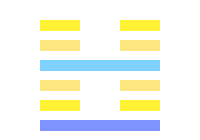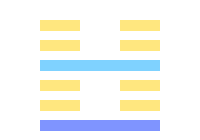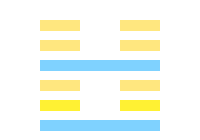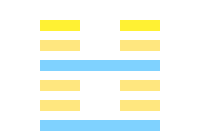51.1.2.6 (51 > 64)

51.1.2.6 (51 > 64) - THE KĂN HEXAGRAM.
- 1. The first line, undivided, shows its subject, when the movement approaches, looking out and around with apprehension, and afterwards smiling and talking cheerfully. There will be good fortune.
- 2. The second line, divided, shows its subject, when the movement approaches, in a position of peril. He judges it better to let go the articles (in his possession), and to ascend a very lofty height. There is no occasion for him to pursue after (the things he has let go) ; in seven days he will find them.
- 6. The topmost line, divided, shows its subject, amidst the startling movements (of the time), in breathless dismay and looking round him with trembling apprehension. If he take action, there will be evil. If, while the startling movements have not reached his own person and his neighbourhood, (he were to take precautions), there would be no error, though his relatives might (still) speak against him.
51.1.2.6 (51 > 64) - Shock
One shows a little enthusiasm to not disappoint one's most fervent admirers.
Bing DeepL Google Yandex51.1.2.6 (51 > 64) - Shock
One shows a little enthusiasm to not disappoint one's most fervent admirers.
Bing DeepL Google Yandex51.1.2.6 (51 > 64) - Kán, l’ébranlement
Kán : tonnerre, effroi répandu, crainte.
- 1. Le tonnerre approchant, on est plein d’effroi ; puis, quand il est passé, on sourit et on parle tous ensemble (on passe de la crainte à la joie).
- 2. Quand le tonnerre gronde, le danger arrive, on croit devoir tout abandonner et se retirer en un lieu sûr et élevé. Qu’on ne s’obstine pas à rechercher alors ce qu’on a abandonné ; on le retrouvera quelque temps après. (Quand le danger sera passé.)
-
6. Le tonnerre répand l’effroi et fait partout regarder avec trouble et crainte. S’il atteint et frappe, il causera un grand mal. (Ou : il corrige le mal.) Mais s’il ne frappe ni tel personnage, ni ses voisins, ce ne sera point un mal et fera seulement jaser les habitants d’une même maison.
Quand le tonnerre gronde, que l’orage éclate, le sage recherche la cause de ce fait (et tâche de profiter de l’avertissement céleste).
51.1.2.6 (51 > 64) - Le choc
On fait preuve d'un peu enthousiasme pour ne pas décevoir ses admirateurs les plus fervents.
Bing DeepL Google Yandex51.1.2.6 (51 > 64) - Megrázkódtatás
- 1. Nevethet miután meglátja.
- 2. Ne keresse ami elveszett.
- 6. Elvesztette a leggyengébbet, visszafogottnak kell maradnia míg nem változnak.
The trigrams
The trigrams are combinations of three yin and yang lines. The three bottom lines of the hexagram form the lower trigram and represent the inner situation. The three top lines form the upper trigram and represent the outer situation.
Upper trigram: The thunder The fire


Lower trigram: The thunder The water


The formation: 51
What is already there

51 - THE KĂN HEXAGRAM.
Kăn gives the intimation of ease and development. When (the time of) movement (which it indicates) comes, (the subject of the hexagram) will be found looking out with apprehension, and yet smiling and talking cheerfully. When the movement (like a crash of thunder) terrifies all within a hundred lî, he will be (like the sincere worshipper) who is not (startled into) letting go his ladle and (cup of) sacrificial spirits.
Bing DeepL Google Yandex51 - Shock
Something is coming which enables the identification of a problem.
Bing DeepL Google Yandex51 - Shock
Something is coming which enables the identification of a problem.
Bing DeepL Google Yandex51 - Kán, l’ébranlement
Kán : tonnerre, effroi répandu, crainte.
Kán« tonnerre, effroi se répandant, appréhension ». Le tonnerre survenant répand l’effroi ; par l’effroi, les rires et les causeries s’arrêtent court. Le tonnerre terrifie cent lis, mais ne doit pas arrêter la cuiller du sacrifice aux esprits (le sacrifice) 1.
1 Le tonnerre peut arrêter tout mais pas empêcher le sacrifice.
Texte
Le tonnerre approchant répand l’effroi ; les rires, les causeries s’arrêtent subitement. Le tonnerre terrifie cent lis, mais ne doit pas arrêter la cuiller du sacrifice aux esprits.
Commentaire
Cet effroi a d’heureux résultats. Les rires et les causeries gardent ainsi la mesure. Le tonnerre terrifie ce qui est loin comme ce qui est près. Mais on doit, quand même, garder le temple des ancêtres, les autels des génies du sol et présider aux sacrifices. (Malgré l’effroi, on ne peut les interrompre.)
Symbolisme
Le tonnerre répété forme l’hexagramme. Le sage, plein de crainte et de scrupules prudents, observe et corrige.
51 - Megrázkódtatás
Valami közelít ami lehetővé teszi a probléma felismerését.
Bing DeepL Google Yandex
51.1 (51 > 16) - THE KĂN HEXAGRAM.
The first line, undivided, shows its subject, when the movement approaches, looking out and around with apprehension, and afterwards smiling and talking cheerfully. There will be good fortune.
Bing DeepL Google Yandex51.1 (51 > 16) - Kán, l’ébranlement
Kán : tonnerre, effroi répandu, crainte.
Le tonnerre approchant, on est plein d’effroi ; puis, quand il est passé, on sourit et on parle tous ensemble (on passe de la crainte à la joie).
Bing DeepL Google Yandex
51.2 (51 > 54) - THE KĂN HEXAGRAM.
The second line, divided, shows its subject, when the movement approaches, in a position of peril. He judges it better to let go the articles (in his possession), and to ascend a very lofty height. There is no occasion for him to pursue after (the things he has let go) ; in seven days he will find them.
Bing DeepL Google Yandex51.2 (51 > 54) - Kán, l’ébranlement
Kán : tonnerre, effroi répandu, crainte.
Quand le tonnerre gronde, le danger arrive, on croit devoir tout abandonner et se retirer en un lieu sûr et élevé. Qu’on ne s’obstine pas à rechercher alors ce qu’on a abandonné ; on le retrouvera quelque temps après. (Quand le danger sera passé.)
Bing DeepL Google Yandex
51.6 (51 > 21) - THE KĂN HEXAGRAM.
The topmost line, divided, shows its subject, amidst the startling movements (of the time), in breathless dismay and looking round him with trembling apprehension. If he take action, there will be evil. If, while the startling movements have not reached his own person and his neighbourhood, (he were to take precautions), there would be no error, though his relatives might (still) speak against him.
Bing DeepL Google Yandex51.6 (51 > 21) - Taking refuge in the heights
One has lost the weakest, so one keeps a low profile until they change.
Bing DeepL Google Yandex51.6 (51 > 21) - Taking refuge in the heights
One has lost the weakest, so one keeps a low profile until they change.
Bing DeepL Google Yandex51.6 (51 > 21) - Kán, l’ébranlement
Kán : tonnerre, effroi répandu, crainte.
Le tonnerre répand l’effroi et fait partout regarder avec trouble et crainte. S’il atteint et frappe, il causera un grand mal. (Ou : il corrige le mal.) Mais s’il ne frappe ni tel personnage, ni ses voisins, ce ne sera point un mal et fera seulement jaser les habitants d’une même maison.
Quand le tonnerre gronde, que l’orage éclate, le sage recherche la cause de ce fait (et tâche de profiter de l’avertissement céleste).
51.6 (51 > 21) - Se réfugier dans les hauteurs
On a perdu les plus faibles alors on reste discret jusqu'à ce qu'ils changent.
Bing DeepL Google Yandex51.6 (51 > 21) - Megrázkódtatás
Elvesztette a leggyengébbet, visszafogottnak kell maradnia míg nem változnak.
Bing DeepL Google YandexIn the making: 64
What is poised to happen

64 - THE WEI 3Î HEXAGRAM.
Wei 3î intimates progress and success (in the circumstances which it implies). (We see) a young fox that has nearly crossed (the stream), when its tail gets immersed. There will be no advantage in any way.
Bing DeepL Google Yandex64 - Instability
One must show patience and act only in full knowledge of the facts. One is attentive and warns one's relatives.
Bing DeepL Google Yandex64 - Instability
One must show patience and act only in full knowledge of the facts. One is attentive and warns one's relatives.
Bing DeepL Google Yandex64 - Wei tzi, ce qui précède l’achèvement.
Wei-tzi : traversée non achevée, oeuvre non achevée, succès interrompu, compromis ; chose non achevée, non menée à bonne fin.
Wei tsi « traversée non achevée, échouer ». C’est comme un jeune renard mis en péril en traversant un fleuve ; son derrière s’y plonge (par la pesanteur de sa queue) ; il ne réussit pas (à échapper).
Texte
Succès compromis, oeuvre non achevée ; c’est comme un jeune renard mis en péril en traversant un fleuve. Son derrière s’enfonce dans l’eau par le poids de sa queue ; il ne réussit pas (à échapper à ce péril).
L’heureux commencement ne continue pas.
Symbolisme
L’eau par-dessous le feu forme le Koua. Le sage use de la plus grande circonspection et attention pour distinguer les hommes et les choses et la position qu’ils doivent occuper.
64 - L'instabilité
On doit faire preuve de patience et n'agir qu'en connaissance de cause. On est attentif et on prévient ses proches.
Bing DeepL Google Yandex64 - Ingatagság
Türelmet kell mutatnia és csak tudatosan szabad fellépnie. Óvatosnak kell lenni és tájékoztatni rokonait.
Bing DeepL Google YandexThe nuclear hexagram: 39.1 (39 > 63)
The nuclear hexagram is the association of the two inner trigrams (lines 2,3,4 and 3,4,5). It represents the root, or the origin of the situation.

39.1 (39 > 63) - THE KIEN HEXAGRAM.
From the first line, divided, we learn that advance (on the part of its subject) will lead to (greater) difficulties, while remaining stationary will afford ground for praise.
Bing DeepL Google Yandex39.1 (39 > 63) - Requesting an evaluation
Others resist because one did not check, so one asks a mediator to review one's work.
Bing DeepL Google Yandex39.1 (39 > 63) - Requesting an evaluation
Others resist because one did not check, so one asks a mediator to review one's work.
Bing DeepL Google Yandex39.1 (39 > 63) - Kién, l’obstacle
Kién : Difficulté, danger, noble hardiesse.
Si l’on va (courageusement) aux choses difficiles, on reviendra comblé de louanges.
Il convient d’être ferme.
39.1 (39 > 63) - Demander une évaluation
Les autres résistent car on n'a pas vérifié, alors on demande à un médiateur de revoir son travail.
Bing DeepL Google Yandex39.1 (39 > 63) - Bizonytalanság
Mások ellenállnak mert nem ellenőrizte, így közvetítőt kér hogy felülvizsgálják a munkáját.
Bing DeepL Google YandexRuler
The starting situation

51.6 (51 > 21) - THE KĂN HEXAGRAM.
The topmost line, divided, shows its subject, amidst the startling movements (of the time), in breathless dismay and looking round him with trembling apprehension. If he take action, there will be evil. If, while the startling movements have not reached his own person and his neighbourhood, (he were to take precautions), there would be no error, though his relatives might (still) speak against him.
Bing DeepL Google Yandex51.6 (51 > 21) - Taking refuge in the heights
One has lost the weakest, so one keeps a low profile until they change.
Bing DeepL Google Yandex51.6 (51 > 21) - Taking refuge in the heights
One has lost the weakest, so one keeps a low profile until they change.
Bing DeepL Google Yandex51.6 (51 > 21) - Kán, l’ébranlement
Kán : tonnerre, effroi répandu, crainte.
Le tonnerre répand l’effroi et fait partout regarder avec trouble et crainte. S’il atteint et frappe, il causera un grand mal. (Ou : il corrige le mal.) Mais s’il ne frappe ni tel personnage, ni ses voisins, ce ne sera point un mal et fera seulement jaser les habitants d’une même maison.
Quand le tonnerre gronde, que l’orage éclate, le sage recherche la cause de ce fait (et tâche de profiter de l’avertissement céleste).
51.6 (51 > 21) - Se réfugier dans les hauteurs
On a perdu les plus faibles alors on reste discret jusqu'à ce qu'ils changent.
Bing DeepL Google Yandex51.6 (51 > 21) - Megrázkódtatás
Elvesztette a leggyengébbet, visszafogottnak kell maradnia míg nem változnak.
Bing DeepL Google YandexCorrection
The direction where the ruler is going to bend

51.1.2 (51 > 40) - THE KĂN HEXAGRAM.
- 1. The first line, undivided, shows its subject, when the movement approaches, looking out and around with apprehension, and afterwards smiling and talking cheerfully. There will be good fortune.
- 2. The second line, divided, shows its subject, when the movement approaches, in a position of peril. He judges it better to let go the articles (in his possession), and to ascend a very lofty height. There is no occasion for him to pursue after (the things he has let go) ; in seven days he will find them.
51.1.2 (51 > 40) - Playing to the gallery with clumsy humour
One dresses up to look different.
Bing DeepL Google Yandex51.1.2 (51 > 40) - Playing to the gallery with clumsy humour
One dresses up to look different.
Bing DeepL Google Yandex51.1.2 (51 > 40) - Kán, l’ébranlement
Kán : tonnerre, effroi répandu, crainte.
- 1. Le tonnerre approchant, on est plein d’effroi ; puis, quand il est passé, on sourit et on parle tous ensemble (on passe de la crainte à la joie).
- 2. Quand le tonnerre gronde, le danger arrive, on croit devoir tout abandonner et se retirer en un lieu sûr et élevé. Qu’on ne s’obstine pas à rechercher alors ce qu’on a abandonné ; on le retrouvera quelque temps après. (Quand le danger sera passé.)
51.1.2 (51 > 40) - Amuser la galerie avec un humour maladroit
On se travestit pour avoir l'air différent.
Bing DeepL Google Yandex51.1.2 (51 > 40) - Megrázkódtatás
- 1. Nevethet miután meglátja.
- 2. Ne keresse ami elveszett.

